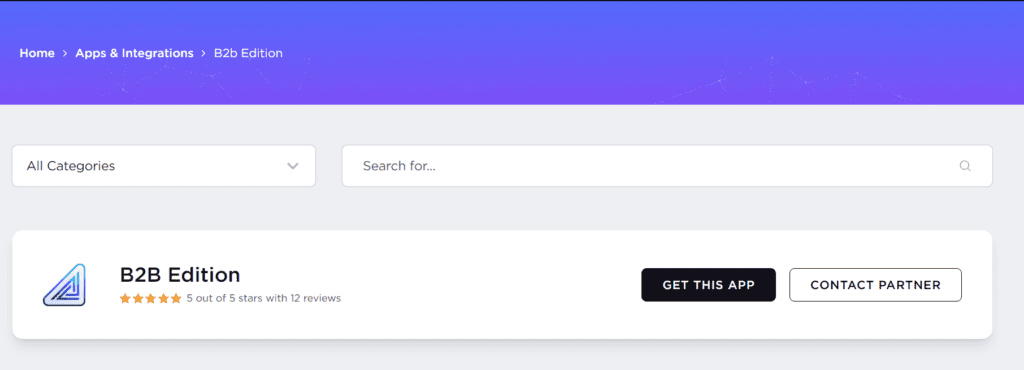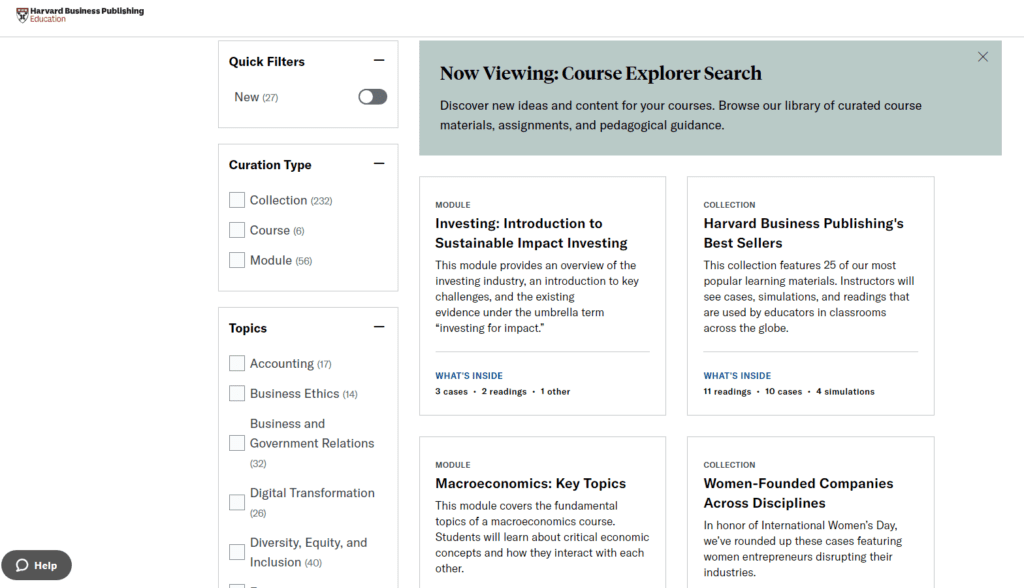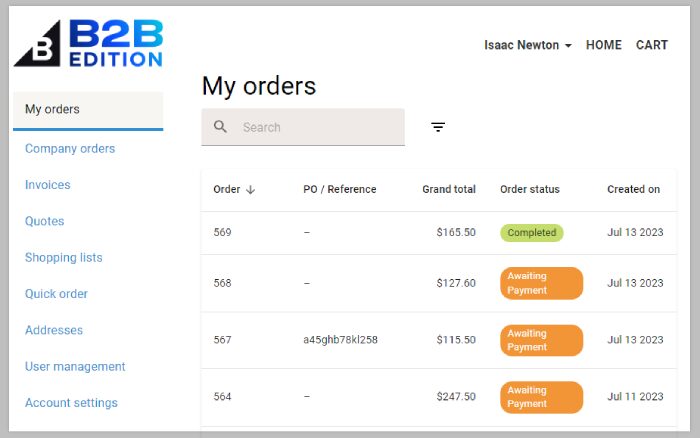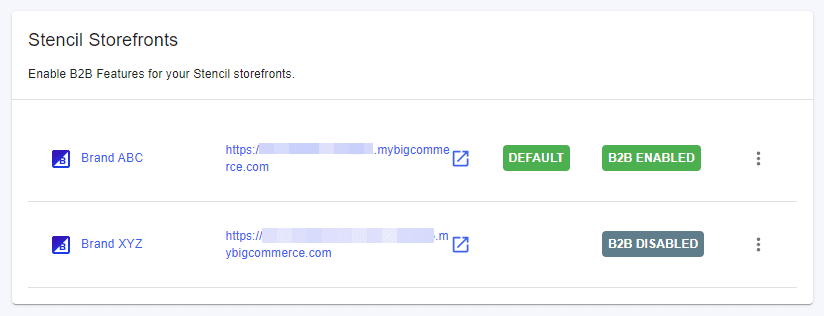B2B ecommerce sales hit a new peak of $2.2 trillion in 2023, and experts predict continuous growth in the coming years. From the biggest brands to new startups looking to make their mark in the space, businesses need a B2B solution that can scale with them and empower them to do more.
BigCommerce’s new offering is an exciting breath of fresh air that simplifies the B2B experience while allowing businesses to expand their operations. Use this Coalition Technologies guide to make the most of this B2B ecommerce solution.

Table of Contents
What’s Different?
B2B Edition enhances the customer and seller experience with a comprehensive suite of tailored features. The app is bundled by default with the B2B Edition package, but users can also install the app separately through the app marketplace. Here’s what makes the B2B Edition a great choice for businesses:
- Corporate Account Management: Simplify administrative work and focus on what matters with new management features. You can set up a corporate account on both the seller and buyer side and assign predefined roles that determine permissions for each user.
For example, you can create your seller user account with BigCommerce’s B2B Edition and quickly assign roles to your employees, such as:
- Administrator: The highest role (below the store owner). Administrators can view and modify most aspects of your B2B ecommerce operation, including store settings and rules.
- Financial Manager: Fin. Managers can export bulk invoice data and create new invoice payments.
- Accountants: Accountants can also export invoice data, but they cannot create new payments.
- Sales Rep: The most basic predefined role. Sales reps can view and manage orders that have been assigned to them but cannot access settings or roles. Reps can also give discounts on top of the pre-agreed prices in the invoice.
Similarly, your B2B customers/buyers can also assign roles within their company once they’ve been added to your company account:
- Admins: Similar to the seller side, buyer admins can control all aspects of their company account, like assigning roles, paying invoices, and adding business addresses.
- Junior & Senior Buyers: Junior buyers can submit shopping lists for the approval of senior buyers or admins – they cannot approve purchases independently.
- Enterprise Features for B2B Ecommerce:
- Price Lists: BigCommerce’s B2B Edition makes price lists simpler than ever. Businesses can assign their existing lists to each company account from their dashboard and set standard prices for new buyers. This feature is especially useful for businesses that want to set different price lists for different customer segments. For example, you can create a custom list for loyal customers.
- Filtering: Choose from 12 preset filters to organize and catalog your products, such as free shipping, rating, and price. Businesses can also create new product filters to create a streamlined purchase process.
- Price Lists: BigCommerce’s B2B Edition makes price lists simpler than ever. Businesses can assign their existing lists to each company account from their dashboard and set standard prices for new buyers. This feature is especially useful for businesses that want to set different price lists for different customer segments. For example, you can create a custom list for loyal customers.

- Super Admin Masquerades: The masquerade feature allows your staff to act as liaisons between your business and your buyers. You can assign a team member to act as a super admin, giving them access to a buyer’s front-end portal. Masquerading as super admins, your staff can place new orders and request quotes on behalf of your buyers. This feature makes B2B ecommerce even more frictionless, and it’s great for buyers who might not have used BigCommerce before.
- Custom Quotes: A one-size-fits-all approach is never ideal in ecommerce, especially considering 65% of B2B buyers prefer personalized experiences. BigCommerce stores, using the B2B Edition, can offer their buyers a customized shopping experience. Instead of being restricted to the default price list, sales reps can build new sales quotes for specific customers. These quotes can include unique discounts and even enable the sale of request-only products that might not be available on the storefront.
- Buyer Portal: The new Buyer Portal is a hub for your B2B ecommerce customers. Customers can view their complete order history at a glance to see what needs to be restocked. Support for shared shopping lists allows buyers to have multiple shopping lists for different departments. For example, a bookstore might have a unique shopping list for each genre.

B2B Edition streamlines ordering through the portal. The new ‘Quick Order’ tab includes a quick order pad. Here, buyers can enter SKUs and quantities to add items to their cart quickly. This B2B ecommerce feature also allows buyers to repurchase items from previous orders.
- Payment Controls: B2B Edition users on BigCommerce can modify approved payment methods like credit cards and payment orders in a few clicks. Around 57% of small/medium-sized B2B stores reported late payments in 2020. Allowing more payment options can, at least in part, reduce late payments. The added flexibility here benefits both buyers and sellers. For example, you could allow cards for small transactions and require payment orders for larger ones.
- Address Books: The buyer in a B2B transaction often has to manage distribution across multiple cities and even states. B2B ecommerce features like address book management can solve distribution challenges. Buyers can quickly add and modify shipping and billing addresses within the portal instead of exporting their order lists to a third-party tool.
- Multi-Storefront Support: Support for multiple storefronts allows businesses to reach new audiences with diverse storefronts while retaining their signature brand consistency. Your B2B Edition dashboard will house each storefront, and you can enable B2B with a single click. Enabling B2B will add the new B2B Edition features to your existing stores.
Once you’ve set it up, you can manage multiple brands and product lines from a centralized B2B ecommerce dashboard. This means each store can have its own unique appearance and features while sharing a common backend. BigCommerce B2B Edition will allow you to synchronize data across those stores and process orders seamlessly.

For example, a business with two storefronts selling both wholesale and retail goods from a single warehouse could speed up its processing times by sharing inventory data for each storefront.
BigCommerce B2B Edition vs. Custom Solutions
B2B Edition covers nearly every basic feature a merchant might need to get started for ecommerce. The impressive list of features begs the question: is the B2B Edition better than a custom platform? Let’s take a look at the main limitations here:
- Scale: B2B Edition’s support for headless ecommerce and one-click integration with apps from the marketplace offers a ton of flexibility. However, as your business grows, you could require additional features or integrations that the platform might not yet support. Stores running on a custom platform have the freedom to add new integrations without needing to wait for an update.
- Customization: Pre-packaged apps can include features you don’t actually need. With a custom solution, you get more value for your money with a platform that can accommodate your workflow and other requirements.
- ROI: The initial cost of a custom solution is easily outweighed by its long-term value compared to the monthly/quarterly fees of a pre-packaged platform. A custom B2B ecommerce platform means you don’t have to pay for features you don’t need.
- Distinctiveness: BigCommerce B2B Edition and other platforms support a wide range of themes and customization features, but a custom platform allows you to make the rules. Businesses can build a unique storefront representing their brand identity, from the product catalog to the buyer’s dashboard.
Your Key To B2B Ecommerce Success
B2B Edition intuitively packages the simplicity you need for long-term operation with the freedom to provide a customized experience for every buyer. If you’d like to elevate your business with a truly bespoke ecommerce solution, contact Coalition Technologies. Thousands of companies rely on our ecommerce expertise to build powerful storefronts that can boost traffic and sales. Reach out today for a free consultation.
FAQs
What is B2B?
Business-to-business (B2B) ecommerce facilitates the trade of goods and services between businesses through online channels like BigCommerce or Shopify. Compared to Business-to-Consumer (B2C), B2B operations can be characterized by:
- Higher standards for personalization and responsive customer service.
- More complex and larger orders involving custom quotations, lengthy negotiations, and structured pricing.
- Contracts and complex payment terms that allow both parties a higher degree of flexibility.
Is BigCommerce a good option for B2B operations?
BigCommerce has already proven itself as a reliable B2C platform, and its established infrastructure allows it to provide a unique hybrid B2B and B2C experience for merchants. If you’re looking to set up a B2B operation, BigCommerce’s plug-and-play features, like B2B Edition, will allow you to get started quickly. Merchants can use features like headless ecommerce and flexible corporate account management to build a streamlined buying experience from the get-go.
What’s the best B2B ecommerce platform for my business?
The right platform for your business can vary depending on factors like scalability, customization, user experience, support for third-party tools, and security. Consider your business’s goals and these factors carefully before deciding.
It’s always better to go with a custom ecommerce solution if you can. Professional agencies can help you maximize your ROI by building a storefront completely tailored to your unique requirements. Custom solutions are bloat-free, secure, and provide a personalized experience true to your brand.


